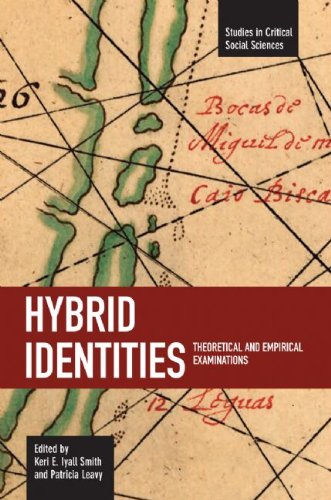Hybrid Identities: Theoretical and Empirical Examinations
Brill Publishing
2008
412 pages
Hardback ISBN-13: 978 90 04 17039 1; ISBN-10: 90 04 17039 1
Edited by
Keri E. Iyall Smith, Assistant Professor of Sociology
Suffolk University, Boston, Massachusetts
Patricia Leavy, Associate Professor of Sociology
Stonehill College, Easton, Massachusetts

Combining theoretical and empirical pieces, this book explores the emerging theoretical work seeking to describe hybrid identities while also illustrating the application of these theories in empirical research. The sociological perspective of this volume sets it apart. Hybrid identities continue to be predominant in minority or immigrant communities, but these are not the only sites of hybridity in the globalized world. Given a compressed world and a constrained state, identities for all individuals and collective selves are becoming more complex. The hybrid identity allows for the perpetuation of the local, in the context of the global. This book presents studies of types of hybrid identities: transnational, double consciousness, gender, diaspora, the third space, and the internal colony.
Contributors include: Keri E. Iyall Smith, Patrick Gun Cuninghame, Judith R. Blau, Eric S. Brown, Fabienne Darling-Wolf, Salvador Vidal-Ortiz, Melissa F. Weiner, Bedelia Nicola Richards, Keith Nurse, Roderick Bush, Patricia Leavy, Trinidad Gonzales, Sharlene Hesse-Biber, Emily Brooke Barko, Tess Moeke-Maxwell, Helen Kim, Bedelia Nicola Richards, Helene K. Lee, Alex Frame, Paul Meredith, David L. Brunsma and Daniel J. Delgado.
Table of Contents
List of Figures
Acknowledgements
I. THEORETICAL STUDY OF HYBRIDITY
1. Hybrid Identities: Theoretical Examinations, Keri E. Iyall Smith
2. Hybridity, Transnationalism, and Identity in the US-Mexican Borderlands, Patrick Gun Cuninghame
3. DuBois and Diasporic Identity: The Veil and the Unveiling Project, Judith R. Blau and Eric S. Brown
4. Disturbingly Hybrid or Distressingly Patriarchal? Gender Hybridity in a Global Environment, Fabienne Darling-Wolf
5. Gender and the Hybrid Identity: On Passing Through, Salvador Vidal-Ortiz
6. Bridging the Theoretical Gap: The Diasporized Hybrid in Sociological Theory, Melissa F. Weiner and Bedelia Nicola Richards
7. Geoculture and Popular Culture: Carnivals, Diasporas, and Hybridities in the Americas, Keith Nurse
8. The Internal Colony Hybrid: Reformulating Structure, Culture, and Agency, Roderick Bush
PART II. EMPIRICAL STUDIES ON HYBRID IDENTITIES
9. An Introduction to Empirical Examinations of Hybridity, Patricia Leavy
10. Conquest, Colonization, and Borderland Identities: The World of Ethnic Mexicans in the Lower Rio Grande Valley, 1900–1930, Trinidad Gonzales
11. Neither Black nor White Enough – and Beyond Black or White: The Lived Experiences of African-American Women at Predominantly White Colleges, Sharlene Hesse-Biber and Emily Brooke Barko
12. Creating Place from Confl icted Space: Bi/Multi Racial Māori Women’s Inclusion within New Zealand Mental Health Services, Tess Moeke-Maxwell
13. Women Occupying the Hybrid Space: Second-Generation Korean-American Women Negotiating Choices Regarding Work and Family, Helen Kim
14. Hybrid Identities in the Diaspora: Second-Generation West Indians in Brooklyn, Bedelia Nicola Richards
15. Hybridized Korean Identities: The Making of Korean-Americans and Joseonjok, Helene K. Lee
16. One Plus One Equals Three: Legal Hybridity in Aotearoa/New Zealand, Alex Frame and Paul Meredith
17. Occupying Third Space: Hybridity and Identity Matrices in the Multiracial Experience, David L. Brunsma and Daniel J. Delgado
Author Biographies
References
Index

